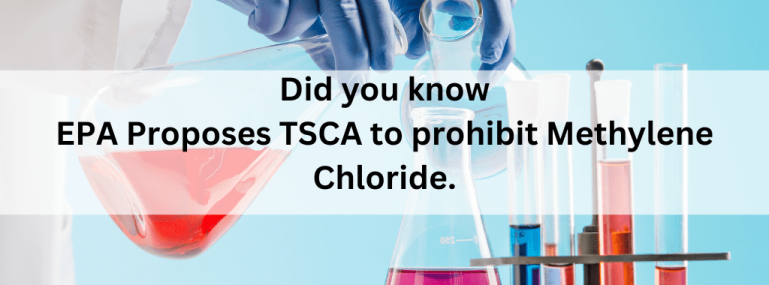To safeguard human health, the EPA proposed on April 20, 2023, to prohibit most methylene chloride applications. In the revised method established by the Frank R. Lautenberg Chemical Safety for the 21st Century Act passed in 2016, methylene chloride is the second chemical that is going through risk control in accordance with the revised method.
Even though methylene chloride is clearly toxic to the body, exposure can result in severe health effects, even death. “For this reason, the EPA is taking action, proposing to outlaw most uses of this chemical, while enacting more rigorous regulations to reduce exposures elsewhere.” To safeguard employee health, workplace regulations are necessary.
This historic proposed ban shows considerable advancement in our efforts to put new chemical safety safeguards in place. In addition, it takes long overdue steps to improve public health.
Objective of this proposal
- To ensure that workers are not harmed when methylene chloride is used for its remaining consumer applications, the workplace must be protected by stringent safeguards.
- The use of methylene chloride in a variety of industrial and commercial applications should be outlawed.
- Regardless of how it is produced, processed, or distributed, the production, processing, and distribution of methylene chloride should be prohibited.
- Ensure that producers (including imports), processors, and wholesalers of methylene chloride inform the organizations they are supplying with methylene chloride of the disallowances and keep records of this information.
Benefits/Effects/Impact
- Alternative products with “similar costs and efficacy… are generally available,” according to an EPA analysis.
- This historic ban proposal demonstrates significant progress in our efforts to implement new chemical safety safeguards and take long-overdue steps to improve public health protection.
- Similar to this, EPA is also recommending that particular uses of methylene chloride required by the National Aeronautics and Space Administration, the Department of Defence, and the Federal Aviation Administration continue with strict workplace controls because sufficient exposure reductions are possible in these highly sophisticated environments, thereby reducing risks to workers.
- Using exposure data from the Toxics Release Inventory over a six-year period, the EPA identified a small number of facilities as posing possible concerns to populations along fence lines. The restrictions in the EPA’s proposed rule would apply to the bulk of these facilities’ continuous methylene chloride usage, effectively removing any potential dangers to the nearby communities
Conclusion:
Compliance XL provides TSCA compliance consulting services and vendor TSCA declaration collections to companies. We also help businesses to maintain their suppliers’ certificates and declarations on a regular basis to ensure they are up-to-date as part of their compliance data management strategy.
FAQs:
1. How does the Toxic Substances Control Act (TSCA) Section 6 work?
Some chemicals are subject to import and export requirements under Section 6 of the Toxic Substances Control Act (TSCA).
2. How does TSCA Section 6 work?
TSCA Section 6(a) requires EPA to address unreasonable risks of injury to health or the environment presented by a chemical substance under the conditions of use determined by the Administrator





